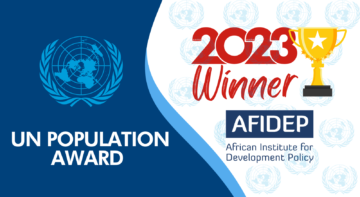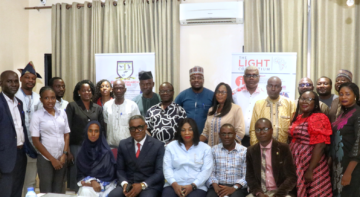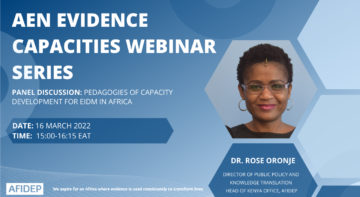Blogs

I spent last week in Lilongwe co-facilitating a training workshop for doctoral researchers just about to complete their PhDs and dive deep into research careers. The workshop was a collaboration between AFIDEP and the Population Reference Bureau (PRB). Among others, the workshop challenged and encouraged the researchers to put policymakers at the centre of their research.
One way we did this was to host a panel conversation with two policymakers in Malawi – a Member of Parliament (Hon. Juliana Lunguzi, MP and Chair of the Parliamentary Committee on Health in Malawi), and Principal Secretary, Ministry of Gender, Children, Disability, and Social Welfare (Dr. Esmie Kainja).
What motivates the two policymakers to consider evidence?
As people interested in strengthening evidence-informed policy-making (EIPM), one of the things we want to understand in-depth is policymakers’ motivations and incentives for evidence use. So, we asked them, amidst all the competing factors, why would they focus on finding and considering evidence in their work? Hon. Lunguzi says, “When I speak in Parliament, I want the government to listen to me. Evidence helps me to get the government to listen.”
She adds that evidence has helped her make strong arguments in Parliament and to challenge some of the suggestions government brings to Parliament because sometimes these are not based on evidence.
Responding to the same question, Dr. Kainja says, “I work in a ministry that deals with vulnerable populations”¦ I use evidence to target resources to ensure that they go to the most in need.” She gives the example of Malawi’s Social Cash Transfer programme, “We have used evidence to ensure we distribute resources to the most in need under the Social Cash Transfer programme”.
“Also, evidence has helped us detect challenges in the programme and address them. For example, evidence has helped us detect cases of wrong targeting where resources were going to the wrong people, and we have resolved these issues. Without evidence, we would not have been able to detect these issues in the first place.”
The evidence the Member of Parliament needs isn’t necessarily the evidence the Principal Secretary needs
As the conversation progressed, it became clear that the two policymakers need quite different types of evidence. This points to the need for those of us promoting EIPM to target and provide evidence that speaks to the needs of the different types of policymakers. Dr. Kainja says, “As government officials, we are focused on solving problems in communities, but sometimes research does not provide us with solutions. We need evidence to help us design and implement programmes that solve community problems.”
She adds, “Our main sources of data are the Ministry of Finance, National Statistics Office, and planning departments within ministries. But often, these agencies face a lot of challenges in capturing and analysing data that different ministries need. So, support to these agencies will ensure that officials in different government ministries get the data they need to solve problems at community level.”
On the other hand, Hon. Lunguzi says, “Two things “ I need to be re-elected, that’s the simple truth. So I need evidence on my constituency “ what are the issues in my constituency and how are these being addressed. With this evidence, I can challenge government programmes and point out where they are failing to effectively address the problems my constituents are facing.”
She adds, “I also need evidence that analyses budgets and bills that the Executive brings to Parliament. This is the only way I can be able to scrutinise these in Parliament.”
When does evidence matter for the two policymakers?
“We need evidence most when we are planning for our activities. We need evidence most when we are designing programmes,” says Dr. Kainja. She adds, “When you bring evidence when we have already started implementing our activities, then it becomes hard for us to consider this evidence.”
This points to the importance of researchers and other evidence producers understanding the planning processes and cycles so that they engage these at the time when evidence is most needed and therefore, most likely to be taken up.
“We also need evidence most when we are budgeting, you know, to inform how we allocate resources,” adds Dr. Kainja. So, if researchers and other evidence producers can understand the budgeting cycle and the opportunities for evidence use to inform how budgets are allocated, this could increase the chances of evidence being considered in decision-making.
For MPs, understanding when parliament is scheduled to discuss and scrutinise budgets and bills is important to inform when evidence is most needed.
For the Principal Secretary, collaborations with researchers is an enabler that cannot be over-emphasised
“We would like researchers to collaborate with us when they are starting their research, not just come to us with research findings. When you involve us at the start of your research, we can ensure that your research is useful to the problems we are trying to address,” says Dr. Kainja. She adds, “also, when you involve us in your research even as co-researchers, we understand the research better and you build our capacity to interpret and apply your research in our work.”
There is a lot of evidence pointing to the crucial role of collaborations and meaningful relationships between researchers and policymakers in enabling evidence uptake in policy and programme decisions. Such collaborations also help researchers understand the complexity of the policy-making process, which is important in informing the research they undertake and how they engage the policy process to enable its uptake.
Enabling environment
Although many of us know the critical importance of an enabling environment for increased demand and use or consideration of evidence, I can’t finish this story without saying anything on this because it kept coming up in the conversation with the two policymakers.
“Imagine I had my own researcher to find and package for me the information I need to debate in Parliament,” asks Hon. Lunguzi. She adds, “I’m lucky because I have a technical background in health and so I’m able to find the evidence I need because I know where to find it. But other MPs are not as lucky as I am, and so it is very difficult for them to contribute to the debate in Parliament.”
The Malawi Parliament only has 6 researchers tasked with supporting 21 parliamentary committees and 193 MPs. These researchers are too few and therefore, unable to meet the demand for evidence in Parliament.
Dr. Kainja says, “Often our planners in ministries lack the high-level capacities needed to analyse and provide the evidence that we need for decision-making. Also, the infrastructure supporting data gathering and analysis in the ministries is very weak. For instance, in the Ministry of Gender, donors have helped us develop an integrated information system, but this system remains weak due to lack of resources and so the information it generates is often incomplete.”
Hon. Lunguzi adds, “The other thing I find funny is that the Standing Orders in Parliament do not allow us to use Google while in plenary. Yet, I think if MPs were allowed to Google for information as the government presents their proposals, this would improve the debate on these proposals.”
She argues that MPs are often short of time to find and read on government proposals before these are tabled in Parliament, and so allowing MPs to search for information online while these proposals are being presented in Parliament is important to improve the quality of debate.
Adding to this, Dr. Kainja says, “For us, even the Internet itself is a problem. We have very poor Internet connectivity at the Ministry and so searching for information that we need online is often not an option.”
For the two policymakers, politics is ever-present in their work and the decisions they make. They argue that while sometimes evidence helps them challenge political interests, other times political leaders deliberately choose to ignore evidence in favour of political positions and interests.
Related Posts





